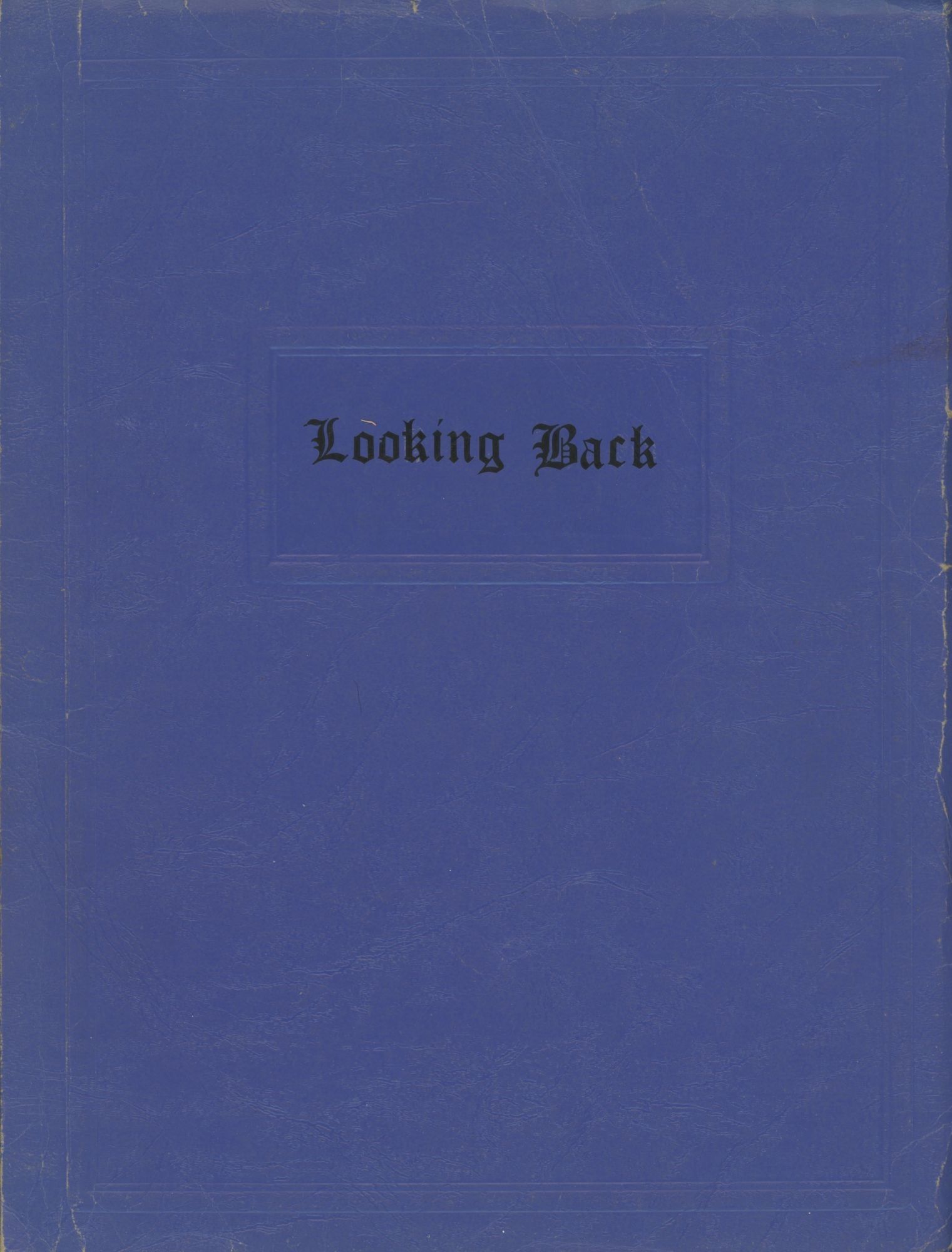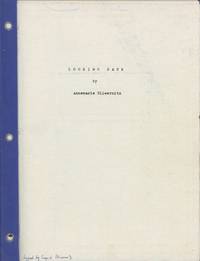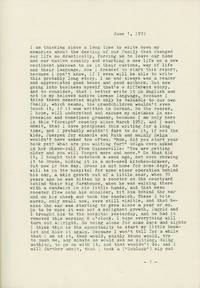Looking Back. [A World War II Memoir by Annemarie Bliwernitz]
- Ninety-four typed and photocopied pages measuring 8 ½ x 11 inches in a soft binding
- St. Petersburg, Florida: unpublished, 1974
St. Petersburg, Florida: unpublished, 1974. Ninety-four typed and photocopied pages measuring 8 ½ x 11 inches in a soft binding. Binding with wear; pages generally excellent to Near Fine. Overall excellent to Near Fine.. Annemarie Bliwernitz (1905–2005), née Entz, was born in Notzendorf, East Prussia. In 1952, after surviving both World Wars, she and her husband Bruno (1900–1992) immigrated first to Canada and then to the United States. Offered here is Annemarie’s unpublished memoir, written between 1972 and 1974.
Bliwernitz grew up in a wealthy, land-owning country family, which she remembers lived far west enough that they did not have to flee the Russians during World War I, and was less affected by the postwar economic situation than were city residents. Most of the memoir is taken up by Bliwernitz’s remembrances of World War II and life leading up to it. Of Hitler’s rise, she writes:
“During these years conditions got worse in Germany [...] A new name came up ‘Adolf Hitler.’ – It was not hard for him to find followers now by the thousands and soon by the millions. He dared to stand up against the Communists with his brown uniformed S.A. men, and a new wind seemed to blow over our illfated land. No wonder young people looked up to him and followed the new star, nobody had much to lose. [...] Bruno and brother-in-law Willy after some meetings attended, showed up in the new brown uniform also, and farmers and laborers seemed to be united in that new idea. – It really changed Germany in a short time, nobody could deny that, unemployment ceased, people got jobs again, and housewives and mothers could buy the necessities of life for their families, especially food. And it brought us to our feet again also.”
Though of course Bliwernitz maintains that the “Concentration Camps and what happened in them was not known to the German people," she mentions that Bruno quickly became an Arbeitsdienstführer—essentially a labor camp overseer—and remembers dissenters being disappeared:
“As an example I will tell about Bruno’s oldest brother Alfred. He was all against Hitler from the beginning. One day he came home and picked up his neighbor’s paper at his frontdoor and wrote his ideas about Hitler and his lies down with pencil. This neighbor reported him, they picked him up and that was the last his family saw of him. They were told ½ year later, that he had died in Stuhm, West Prussia, a Concentration Camp. No explanation to his wife whatsoever. The same destiny happened to my co-worker, a highly educated person at the Translation Office. She said in the lavatory, where many ladies could hear: Hitler’s big picture in the office should be placed here in the toilet-rooms, where it belongs. One of the ‘kind’ co-workers reported her and she came next day only to pick up her belongings and was not seen any more.”
While Bruno is sent to the Eastern Front, Bliwernitz and their children flee the Russians, trying to reach the Americans on the Western Front. Along the way, they encounter deserting German soldiers and, near Hamburg, liberated camp inmates:
“Shooting started close to us and we heard bombs exploding, would we be hit? We found out, that the Concentration Camp near us had been opened and those freed inmates had shot their guardians. At daybreak we met the first one, still in his black and white striped prison-suit, kneeling on the ground by the chicken-coop and with his both hands feeding himself out of the bowl with the chicken food. [...] They came to us begging for a little bit of salt, to cook the horse-meat they had cut out of the dead horses lying along the ditches [...] We talked to them and I remember one told me, he was imprisoned because of his religion not to go to any war. He was from Elbing, where I had gone to school as a young girl.”
The family are reunited with Bruno, and shortly before they surrender to the Americans, they destroy the evidence of their party involvement: “Bruno’s N.S.D.A.P. membership-card, my certificate for the ‘mother’s cross’, the passports of Horst and Juergen, showing that they had been students of the Nazi-school in Stuhm etc.” After the German surrender, the family is sent back east, where they struggle to avoid starvation, then return west, where they are sent to live in Hardegsen. They finally decide in 1951 to emigrate, as life in postwar Germany is simply too difficult, but make the mistake of being honest about their history:
“Another big obstacle for us was, that Bruno had been in a member in a Nazi-party, though not an active one. But it was still a handicap in those days for any undertaking. We had not kept it secret in our immigration papers and they wanted a detailed description about our political involvement. That we did, wrote a long letter in German, didn’t have the money for an interpreter and never got an answer. [...] That was a bitter pill to swallow.”
After this they decide to try for Canada instead, and this time savvily “didn’t mention any Nazi-party attachment”. This is a success; the family moves to Winnipeg and eventually to St. Petersburg, Florida, where the narrative was written. Bliwernitz recalls working as a housekeeper, which she contrasts with her previous life, in which she and her family would not allow maids, farm hands, or tradesmen to eat at their table with them.
Of interest to historians of the German civilian experience during the Second World War, especially that of women and children.
Bliwernitz grew up in a wealthy, land-owning country family, which she remembers lived far west enough that they did not have to flee the Russians during World War I, and was less affected by the postwar economic situation than were city residents. Most of the memoir is taken up by Bliwernitz’s remembrances of World War II and life leading up to it. Of Hitler’s rise, she writes:
“During these years conditions got worse in Germany [...] A new name came up ‘Adolf Hitler.’ – It was not hard for him to find followers now by the thousands and soon by the millions. He dared to stand up against the Communists with his brown uniformed S.A. men, and a new wind seemed to blow over our illfated land. No wonder young people looked up to him and followed the new star, nobody had much to lose. [...] Bruno and brother-in-law Willy after some meetings attended, showed up in the new brown uniform also, and farmers and laborers seemed to be united in that new idea. – It really changed Germany in a short time, nobody could deny that, unemployment ceased, people got jobs again, and housewives and mothers could buy the necessities of life for their families, especially food. And it brought us to our feet again also.”
Though of course Bliwernitz maintains that the “Concentration Camps and what happened in them was not known to the German people," she mentions that Bruno quickly became an Arbeitsdienstführer—essentially a labor camp overseer—and remembers dissenters being disappeared:
“As an example I will tell about Bruno’s oldest brother Alfred. He was all against Hitler from the beginning. One day he came home and picked up his neighbor’s paper at his frontdoor and wrote his ideas about Hitler and his lies down with pencil. This neighbor reported him, they picked him up and that was the last his family saw of him. They were told ½ year later, that he had died in Stuhm, West Prussia, a Concentration Camp. No explanation to his wife whatsoever. The same destiny happened to my co-worker, a highly educated person at the Translation Office. She said in the lavatory, where many ladies could hear: Hitler’s big picture in the office should be placed here in the toilet-rooms, where it belongs. One of the ‘kind’ co-workers reported her and she came next day only to pick up her belongings and was not seen any more.”
While Bruno is sent to the Eastern Front, Bliwernitz and their children flee the Russians, trying to reach the Americans on the Western Front. Along the way, they encounter deserting German soldiers and, near Hamburg, liberated camp inmates:
“Shooting started close to us and we heard bombs exploding, would we be hit? We found out, that the Concentration Camp near us had been opened and those freed inmates had shot their guardians. At daybreak we met the first one, still in his black and white striped prison-suit, kneeling on the ground by the chicken-coop and with his both hands feeding himself out of the bowl with the chicken food. [...] They came to us begging for a little bit of salt, to cook the horse-meat they had cut out of the dead horses lying along the ditches [...] We talked to them and I remember one told me, he was imprisoned because of his religion not to go to any war. He was from Elbing, where I had gone to school as a young girl.”
The family are reunited with Bruno, and shortly before they surrender to the Americans, they destroy the evidence of their party involvement: “Bruno’s N.S.D.A.P. membership-card, my certificate for the ‘mother’s cross’, the passports of Horst and Juergen, showing that they had been students of the Nazi-school in Stuhm etc.” After the German surrender, the family is sent back east, where they struggle to avoid starvation, then return west, where they are sent to live in Hardegsen. They finally decide in 1951 to emigrate, as life in postwar Germany is simply too difficult, but make the mistake of being honest about their history:
“Another big obstacle for us was, that Bruno had been in a member in a Nazi-party, though not an active one. But it was still a handicap in those days for any undertaking. We had not kept it secret in our immigration papers and they wanted a detailed description about our political involvement. That we did, wrote a long letter in German, didn’t have the money for an interpreter and never got an answer. [...] That was a bitter pill to swallow.”
After this they decide to try for Canada instead, and this time savvily “didn’t mention any Nazi-party attachment”. This is a success; the family moves to Winnipeg and eventually to St. Petersburg, Florida, where the narrative was written. Bliwernitz recalls working as a housekeeper, which she contrasts with her previous life, in which she and her family would not allow maids, farm hands, or tradesmen to eat at their table with them.
Of interest to historians of the German civilian experience during the Second World War, especially that of women and children.





